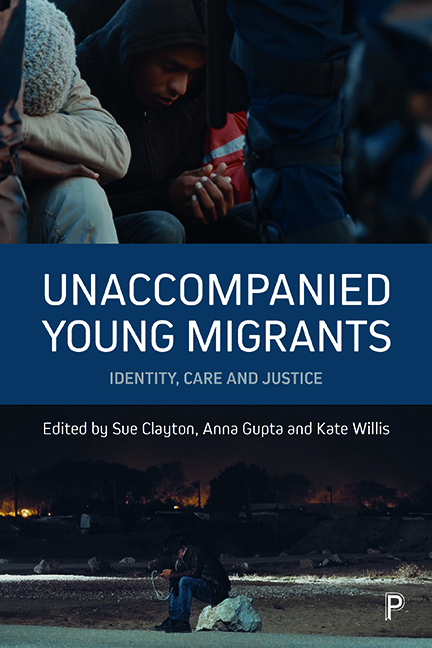five - From individual vulnerability to collective resistance: responding to the emotional impact of trauma on unaccompanied children seeking asylum
Published online by Cambridge University Press: 21 April 2022
Summary
‘Haseeb’, an Afghan teenage boy, sits clenching a damp tissue in a therapy session at the Tavistock Centre in London. He is saying through gritted teeth how violently angry he feels at getting another refusal for asylum from the Home Office. He has endured weeks of anguish, nightmares and flashbacks returning with a vengeance, while waiting for the fateful day of his court hearing. He has tried so hard at school to be the brilliant student that he was back home, but has so struggled to concentrate that his grades have been poor. He has some friends, but the racism he faces from many of his peers makes him feel lonely and inadequate. He misses Afghan food as his foster family are African, and none of them come with him to the mosque as they don't share his religion.
A central challenge for separated young people seeking asylum is to reconstruct their identities in the context of a new home, new culture, an entirely new set of relationships with no shared history, a new language. In sum, they have none of the anchors that they have grown up with that tell them who they are, and what their purpose is in life. This momentous task of identity reconstruction has to take place alongside the process of mourning for the loss of everything and everyone that they have known and relied on, and at the same time their having to navigate the usual developmental tasks of adolescence. These extraordinary challenges so often take place in environments that are hostile and rejecting, and where sources of positive reinforcement are very sparse. Our job as mental health and social care practitioners is not only to support young people through this minefield, but also to help them reconnect with positive identities, to take hold of hopes and dreams for their future, and help them draw on available communities who can support these.
The risks of individualistic problem-focused interventions
Negative accounts of refugees abound in our national media, as Sue Clayton discusses in Chapter Four, and refugee children are often subjected to racism and social marginalisation in their schools (Rutter, 2006). Added to this, the experience of being uprooted from family, community and homeland, of witnessing terrifying events, and often of having had to endure violence and abuse, means that the emotional wellbeing and identity of separated young people can be profoundly disrupted.
- Type
- Chapter
- Information
- Unaccompanied Young MigrantsIdentity, Care and Justice, pp. 135 - 158Publisher: Bristol University PressPrint publication year: 2019

